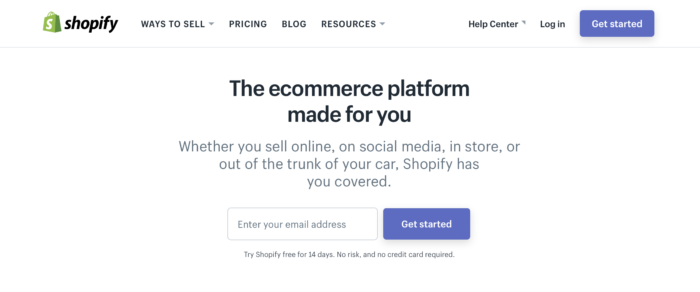When building a website for your e-commerce brand, you may be wondering what website builder you should use. Generally, this question will lead to two main contenders, Shopify versus WordPress. So which one will better address your needs?
Shopify versus WordPress
These website builders have a lot to offer their users. However, they may be best used for different kinds of brands. Just like your business, your website isn’t necessarily one size fits all.
The Main Difference
The main difference between Shopify and WordPress is that Shopify is an online tool and WordPress is a stand-alone software.
If you want to use Shopify, all you have to do is go to their website and sign up for an account. From there you’ll have to go through a quick setup, but that’s all that’s required to get your business up and running.
If you want to use WordPress as your e-commerce platform, you’ll have to jump through a lot more hoops. First, you’ll have to buy a domain and web hosting account. Then you’ll need to pick a theme for your website and install a plugin like WooCommerce. This will give you all the e-commerce features not automatically built into WordPress. Finally, you’ll have to go through the configuration process of your store by adding store details, payment gateway integrations, and products.
Shopify is a lot like buying a model and putting it together. WordPress is like buying the materials and putting it together from scratch yourself.
What is Shopify?
Shopify is an all in one e-commerce tool. It allows you to build a functional e-commerce store from scratch without needing a designer or developer’s help. This means that you won’t need any coding skills to use Shopify.
On Shopify, you can sell whatever goods, services, or products you want. You can also use it offline and online. Plus, you get your subdomain for free and have access to 24/7 support.
What is WordPress?
WordPress has a lot of different functions, but when comparing it to Shopify, it’s important to focus on its e-commerce capabilities. This means that many of its features and abilities can be disregarded in the nature of this comparison.
WordPress is an all-in-one website software. You can build any website you want if you can handle it’s slightly technical setup. You’ll have to install your own plugins, theme, and e-commerce plugin to manage your store operations. This means that you’ll need some website building skills.
Shopify versus WordPress: Cost
Shopify is a paid tool. There are no free options, and it can cost as much as $299 a month, or as little as $29 a month. How much you pay will depend on what kind of services you want available on your site. The most significant difference between the cheapest plan and the most expensive plan is the addition of third-party calculated shipping rates and an advanced report builder.
WordPress is a free and open resource. However, it does have extra costs for hosting and an SSL certificate. Plus, you might decide to pay more for a customized theme or e-commerce plugin.
Shopify versus WordPress: SEO Support
Shopify automatically generates an XML sitemap and provides titles or Meta tags to avoid any duplicity and allows it to be SEO friendly.
However, you will be pretty confined if you’re looking for total control over your outlook for SEO. Using Shopify you won’t be able to change all of the things you would like. You can easily apply on-page SEO to your Shopify website. However, your options will be limited when building readership and content marketing, which is better SEO.
WordPress tends to have better SEO than Shopify because it is a lot more customizable for the small percentage of sites that need additional customizations. WordPress’s blog platform is naturally more SEO friendly. Additionally, choosing to edit your base URL structures, permalinks, and other SEO-related elements is easy to do, and you can also use free plugins like YOAST to boost your SEO even more!
SEE ALSO: On-Page SEO Optimization
Shopify versus WordPress: Hosting
When using Shopify, you’ll need to purchase a domain, and then Shopify will provide hosting on their CDN network.
WordPress requires you to purchase a hosting and domain for uploading a website.
The difference comes from Shopify already being an e-commerce focused service. It is due to that focus that it gets the advantage in hosting and is safer to use because of its stronger security.
Shopify versus WordPress: Set Up and Usage
Shopify is by far the easiest to use when setting it up because you pay for the convenience.
WordPress can take one to two hours to set up on your own. You’ll need to handle SSL, pages, custom theme, and WooCommerce during the process to make sure that your website can handle your e-commerce traffic.
Shopify versus WordPress: Customization
Shopify is customizable but only to a certain point. If you want different options, you will probably have to pay for them or use the ones another Shopify developer has created.
WordPress is completely customizable from the beginning. It is an open source so anything about the functionality of your website can change based on your preferences.
Shopify versus WordPress: Performance
Shopify sites are fast which make them easy to browse through, however, if you add a lot of products or get a lot of traffic you’ll see significant performance degradation.
WordPress has a different focus than fast performance. They want to make sure that your website is easy to use, so while it may not be high-performance, it will have easy to use filtered templates.
Shopify versus WordPress: Products
Shopify was made to be an e-commerce site. This makes it no surprise that it can handle any number of products you can throw at it. No matter how many products you add, your website won’t get slower.
WordPress might work best for the casual user, or just someone who isn’t experienced with coding, if you have a more limited number of products.
Shopify versus WordPress: Product Attributes
Shopify only offers three product attributes themselves, and will actually limit how many variants your products can have. Additionally, Shopify has a 100 variant limit. This may sound like a lot, but if you’re selling a dress that comes in five sizes and five colors, you already have 25 variants for it.
WordPress is created by you. It was made to be customized, so it has unlimited product attribute options.
Shopify versus WordPress: FTP Process
Shopify does not have FTP.
WordPress allows you to access your website with FTP so that the files of your site can be downloaded or uploaded using FTP.
Shopify versus WordPress: Checkout
Shopify allows links to its custom default page only without much room for customizing.
WordPress will allow you to customize the layout of your checkout page.
When to Use Shopify Over WordPress?

Shopify has made itself stand out for being the tailor-made e-commerce solution for anyone who might not have any website building or coding skills but still wants to run an online business.
You can get started with Shopify in minutes and begin serving customers immediately. Shopify will help you with inventory, taxes, shipping, and just about every aspect of your business.
You should use Shopify when:
- Your brand doesn’t have any kind of website and you want to launch your store fast.
- You don’t have any design, coding, or website building skills, and you don’t want to hire someone to set up your website for you.
- You’re wanting to integrate your online store with your offline on-location store.
- You need a high e-commerce platform with easy access to customer support.
When to Use WordPress Over Shopify?

WordPress is a nearly perfect website platform that is capable of running almost any kind of website. This free piece of software can be installed by yourself and then configured to your specifications.
WordPress is the perfect solution for the more savvy user. This kind of user can find and install all of the plugins they want for the services they want to provide.
You should use WordPress when:
- You already have a WordPress site and are familiar with its interface.
- Your brand already has a WordPress site and wants to minimize costs by not having to invest more funds into a new e-commerce platform.
- You’re comfortable playing with source code occasionally.
- You’re okay without 24/7 customer support
Final Thoughts
Creating a website can be a confusing experience, choosing your developer shouldn’t be. Whether you go with Shopify or WordPress, your website will be able to deliver the superior products your brand will be known for. Find what works for you and take off running. If what you pick doesn’t work out like you thought it would don’t be afraid to switch it up later. Both of these website developers can offer you help if you run into any snags along the way. There should be nothing stopping you from pushing your e-commerce business to success.
Have you created an e-commerce business using either of these website developers?










